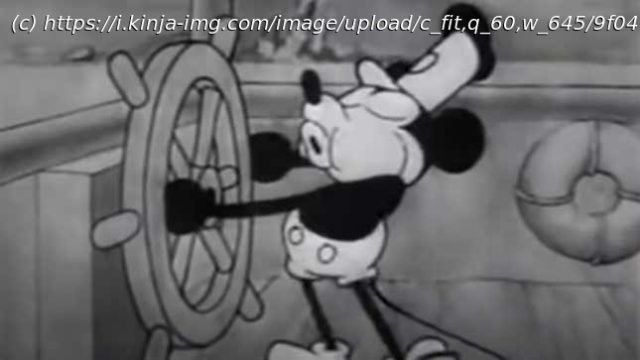January 1, 2024 is the day Disney’s grip on US copyright law lessens ever so slightly: but what does Steamboat Willie’s entry into public domain actually mean?
Mickey Mouse is finally in the hands of the public, to do whatever they want with him. Well, in part. After Disney infamously helped delay the moment, today is the day Steamboat Willie, the first Disney animated short to star Mickey and Minnie Mouse, become public domain. But what does that mean? Simultaneously a lot and not much.
Legal copyright doesn’t last forever—and was never meant to. Copyright law is meant to balance a fine line between creators being able to have a legal stake in (and ability to financially profit from) their works for the duration of their lives, and the larger public good of having those works enter the public forum, where anyone can remix and reuse them, and develop new iterations, but also crucially archivists can safely collect and copy historical work for safekeeping without threat of legal reprisal.
The public domain is a living archive of cultural media history that anyone can access and use, and the end-goal of every piece of copyrighted work. Although different countries have different rules about just how long something can remain copyright before entering it (Steamboat Willie is entering public domain today specifically in regards to U.S. law), today’s additions mark a significant milestone for copyright law and the age of Hollywood studio dominance, because Mickey himself has spent decades being the face of the fight between the onerous grip of capitalism and the public domain.
The version of Mickey and Minnie that enter public domain today were created in 1928, and while they’re not the first significant characters to enter public domain in recent history—both Sherlock Holmes and Winnie the Pooh are notable recent ones—their arrival is so important because Disney has spent years fighting to stave off this moment. In 1998, citing attempts to protect the U.S. entertainment industry at large and also bring the country into line with European copyright laws, Congress signed the Sonny Bono Copyright Term Extension Act, which added a 20 year extension to the terms previously laid out in the Copyright Act of 1976.
Instead of copyrighted works expiring 50 years after the death of the author or after 75 years for work of corporate authorship (as is the case with Disney material like Steamboat Willie), it became 70 and 95 years, respectively. The act was derisively known, however, as the “Mickey Mouse Protection Act,” given that Disney was a major force in lobbying for the extension in the hopes that it could keep Mickey Mouse in any form out of public hands for as long as it could. Although the Copyright Term Extension act wasn’t retroactive for already expired copyright cases, it retroactively applied to anything remaining under copyright at the time of passing, in effect closing the door on works entering the public domain from 1998 all the way until 2019, a huge blow for it as a source of archivable media history.
Start
United States
USA — software Everything You Need to Know About Mickey Mouse's Public Domain Debut Today






